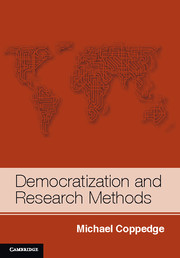Book contents
- Frontmatter
- Contents
- List of tables
- List of figures
- Acknowledgments
- 1 Research methods and democratization
- 2 Defining and measuring democracy
- 3 Criteria for evaluating causal theories
- 4 Checklists, frameworks, and Boolean analysis
- 5 Case studies and comparative history
- 6 Formal models and theories
- 7 Rigor in extensive and intensive testing
- 8 Political culture and survey research
- 9 Quantitative testing
- 10 An agenda for future research
- References
- Index
7 - Rigor in extensive and intensive testing
Published online by Cambridge University Press: 05 July 2012
- Frontmatter
- Contents
- List of tables
- List of figures
- Acknowledgments
- 1 Research methods and democratization
- 2 Defining and measuring democracy
- 3 Criteria for evaluating causal theories
- 4 Checklists, frameworks, and Boolean analysis
- 5 Case studies and comparative history
- 6 Formal models and theories
- 7 Rigor in extensive and intensive testing
- 8 Political culture and survey research
- 9 Quantitative testing
- 10 An agenda for future research
- References
- Index
Summary
Chapters 3–6 developed criteria for a good theory and surveyed many of the strategies used to develop theories of democratization. Chapters 8 and 9 survey the results of theory testing. This chapter introduces these tests by laying out criteria for rigor in testing. How to test rigorously occupies most of the chapter because it is the most complex issue. Many discussions of rigorous testing are confined to statistical testing. My perspective gives equal weight to qualitative methods, which support rigorous testing of a different kind. I argue that there are two fundamentally different kinds of testing that serve different but complementary purposes. The first is extensive testing, which helps establish that a causal relationship is generally true, on average, in a large sample. The second is intensive testing, which reveals which of several competing explanations best explains a specific outcome in a single case. Ultimately, a good theory should make predictions that survive both extensive and intensive testing.
Before developing these arguments, there are three preliminary questions that must be answered: Why is testing necessary? When is a theory ready to be tested? And what about the theory should be tested? The prevalence of untested propositions in comparative politics (such as most of those discussed in Chapters 4–6) suggests that a justification of testing is needed. Testing is necessary because many propositions that seem obviously, incontrovertibly true turn out to be false when exposed to evidence. Why do they seem to be true? There are several reasons. First, some propositions are intuitively appealing; that is, they are consistent with other ideas that we do not question. The problems with intuition are that (1) it does not require any systematic comparison of the consistency of the new ideas with the old ones, and (2) the old ideas that have gone unquestioned may themselves be false. A good example is the common assumption of Washington policy makers and pundits that democracy and free-market capitalism are mutually reinforcing. The catchphrase “open markets, open societies” is widely accepted, but mostly because it conforms to the prevailing liberal individualist ideology, which conveniently overlooks promarket dictatorships and statist or protectionist democracies.
- Type
- Chapter
- Information
- Democratization and Research Methods , pp. 194 - 221Publisher: Cambridge University PressPrint publication year: 2012

